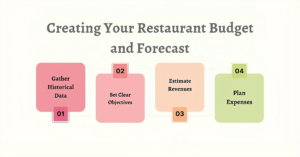The restaurant industry is dynamic and competitive, and careful financial management is crucial for success. Creating a detailed budget and forecast is one of the most effective tools for restaurant owners. In the fast-paced and fiercely competitive restaurant business, sound financial management is essential to success. Creating a detailed budget and forecast is one of the most effective tools for restaurant owners. We will examine the complexities of restaurant forecasting and budgeting in this post, emphasizing the value of expert restaurant accounting services. We’ll also talk about how services like bookkeeping for restaurants can be a great resource and how to locate a trustworthy “bookkeeper near me.”
The Importance of Budgeting and Forecasting for Restaurants
Planning your restaurant’s budget and forecast is similar to having a road map for your financial future. It’s a proactive strategy that enables you to make wise resource allocation decisions, set financial objectives, and adjust to shifting market conditions. This is the reason it’s crucial:
- Financial Planning: A budget sets clear financial goals and provides a blueprint for achieving them. It helps you allocate resources efficiently and plan for expenses, such as rent, utilities, and inventory.
- Risk Management: Forecasts help you anticipate financial challenges and adapt to them promptly. This could include fluctuating food costs, staffing issues, or unforeseen market changes.
- Decision-Making: Budgets and forecasts offer a data-driven basis for decision-making. Should you expand your menu, hire more staff, or invest in marketing? A well-prepared budget and forecast can provide insights into these questions.
- Tracking Performance: Once your restaurant operates, comparing actual financial results to your budget and forecast allows you to identify variances and take corrective actions as needed.
The Role of Restaurant Accounting Services
Creating a budget and forecast for a restaurant requires a deep understanding of the industry’s specific financial challenges and opportunities. That’s where restaurant accounting services come into play. Here are some ways they can assist:
1. Expertise: Professional restaurant accountants bring expertise in the nuances of restaurant finance. They understand the intricacies of managing food costs, handling tips, and complying with tax regulations specific to the industry.
2. Data Analysis: These experts can analyze historical financial data and industry benchmarks to create realistic forecasts and budgets. They have a deep understanding of key performance indicators (KPIs) that drive restaurant success.
3. Software Utilization: Restaurant accounting services often employ advanced accounting software tailored to the industry. This helps streamline the budgeting and forecasting process, improving accuracy and efficiency.
4. Tax Planning: Restaurant accounting services can provide valuable guidance on tax planning and compliance, ensuring you take advantage of available deductions while avoiding costly errors.
Creating Your Restaurant Budget and Forecast
Now, let’s dive into the practical steps for creating a restaurant budget and forecast. Follow these guidelines, and you’ll be on your way to financial success:
1. Gather Historical Data:
Start by collecting financial data from previous months or years. This should include sales figures, expenses, and other relevant information. Historical data provides a solid foundation for forecasting.
2. Set Clear Objectives:
Define your financial goals. Do you want to increase revenue, reduce costs, or improve profitability? Be specific and realistic about what you aim to achieve.
3. Estimate Revenues:
Project your future sales based on historical data and any anticipated changes, such as seasonal variations. Consider factors like menu changes or marketing efforts that could impact revenue.
4. Plan Expenses:
List all your expenses, from food and beverage costs to rent, utilities, and staff salaries. Be thorough, and consider both fixed and variable expenses. Account for contingencies.
5. Cash Flow Projection:
Create a cash flow projection to ensure sufficient liquidity to cover your expenses. This step is essential for day-to-day operations and handling unexpected costs.
6. Continuous Monitoring:
A budget and forecast are not set in stone. Regularly monitor your actual financial performance against the projections. If you encounter significant variances, investigate the causes and make adjustments as necessary.
Leveraging Restaurant Bookkeeping Services
While budgeting and forecasting are pivotal for financial planning, the day-to-day financial management of a restaurant is equally crucial. This is where restaurant bookkeeping services come into play.
1. Accurate Record-Keeping:
Restaurant bookkeeping services ensure that every financial transaction, from ingredient purchases to customer payments, is accurately recorded. This meticulous record-keeping forms the basis for budgeting and forecasting.
2. Expense Categorization:
Bookkeepers categorize expenses and income, making it easier to track costs, identify trends, and generate meaningful reports for financial analysis.
3. Payroll Management:
Bookkeeping services handle payroll, ensuring staff wages and taxes are accurately calculated and paid on time.
4. Inventory Control:
Managing restaurant inventory is a critical aspect of cost control. Bookkeepers can help track inventory levels and costs, preventing waste and theft.
Finding a “Bookkeeper Near Me”
If you’re considering hiring a restaurant bookkeeper, the question, “How do I find a reliable bookkeeper near me?” is a common one. Here are some tips:
1. Local Referrals: Ask fellow restaurant owners or business colleagues for recommendations. Local referrals often lead to reliable and trusted professionals.
2. Online Search: Use search engines and online directories to find bookkeepers or accounting firms in your area. Check for reviews and ratings from previous clients.
3. Professional Associations: Contact local chapters of professional accounting organizations like the American Institute of Professional Bookkeepers (AIPB) to find qualified bookkeepers in your area.
Conclusion
Creating a restaurant budget and forecast is an essential part of financial management in the restaurant industry. It provides a roadmap for achieving financial goals, managing risks, and making informed decisions. To ensure the accuracy and reliability of your financial data, consider leveraging the expertise of restaurant accounting services and the precision of restaurant bookkeeping services. When finding a “bookkeeper near me,” take your time to research and select a trusted professional to handle your restaurant’s financial affairs. With the right financial planning and support, your restaurant can thrive in a competitive and ever-changing market. Learn more.
